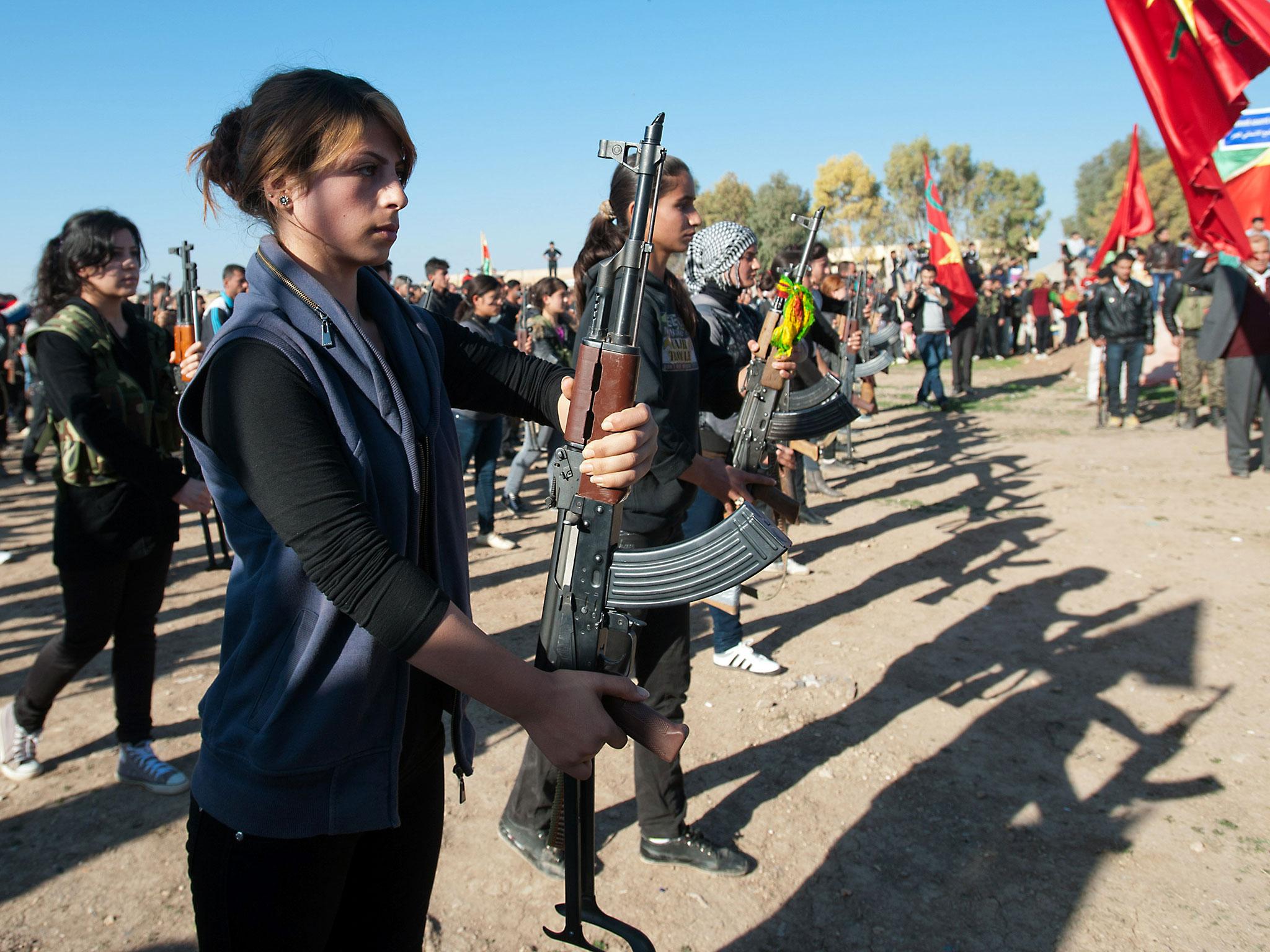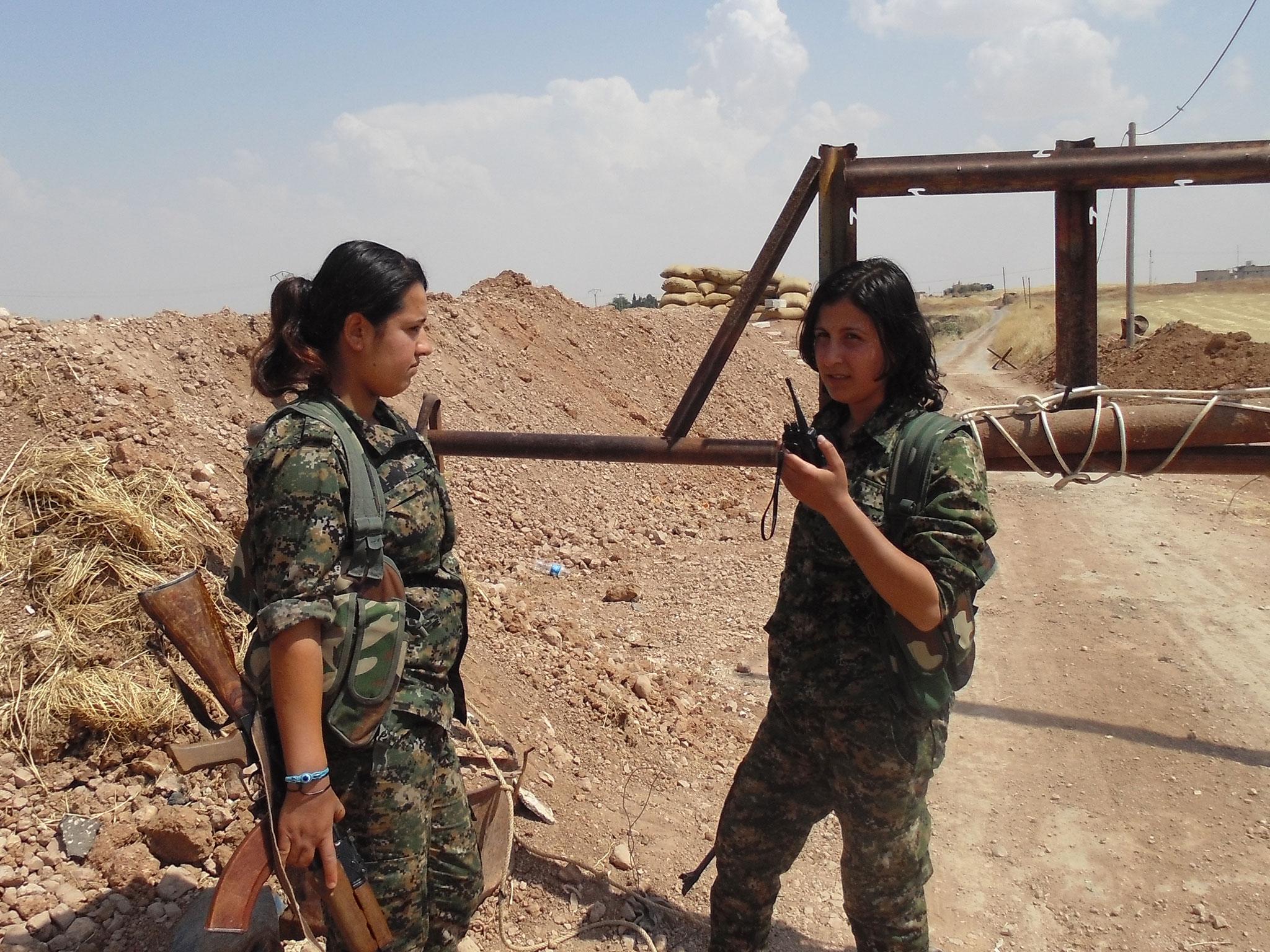War with Isis: Meet the Kurdish women's militia fighting for their families west of the Syrian town of Ras al-Ayn
Exhausted from days of fighting, Kurdish women are leading a pincer movement against Isis at the northern end of the road that leads to the jihadists’ Syrian capital. They speak to Patrick Cockburn in Ras al-Ayn, Syria

Your support helps us to tell the story
From reproductive rights to climate change to Big Tech, The Independent is on the ground when the story is developing. Whether it's investigating the financials of Elon Musk's pro-Trump PAC or producing our latest documentary, 'The A Word', which shines a light on the American women fighting for reproductive rights, we know how important it is to parse out the facts from the messaging.
At such a critical moment in US history, we need reporters on the ground. Your donation allows us to keep sending journalists to speak to both sides of the story.
The Independent is trusted by Americans across the entire political spectrum. And unlike many other quality news outlets, we choose not to lock Americans out of our reporting and analysis with paywalls. We believe quality journalism should be available to everyone, paid for by those who can afford it.
Your support makes all the difference.The Kurdish soldiers relax half a mile behind the front line where they have been battling Isis forces west of the Syrian town of Ras al-Ayn. The women are in no doubt about why they are fighting.
Nujaan, who is 27 and has been a soldier for four years, says that Isis’s “target is women”. She says: “Look at Shingal [in Iraq] where they raped the women and massacred the men. It is a matter of honour to defend ourselves first, and then our families and lands.” Sitting beside her is Zenya, 22, who adds that she also “is fighting for myself and my family”.
Overhead, the drone of US aircraft is clearly audible and Nujaan reports that there have been several air strikes that morning, as well as ground fighting.
She says that several Kurdish soldiers have been killed and wounded, though she does not know the details. She adds that the YPJ Kurdish women’s militia, to which she belongs, is gradually driving Isis towards the west. She and the other women appear remote and detached from what they are saying, possibly because they are exhausted from days on the front line.
In fact, the push westwards mentioned by Nujaan is of great military and possibly political significance because the Syrian Kurdish armed forces are closing in on a crucial Isis-controlled border crossing point from Syria into Turkey at Tal Abyad. The Syrian Kurds note bitterly that Turkey has closed the crossing points into Kurdish-held territory, but has kept open those used by Isis.
But now Tal Abyad, the northern end of the road that leads straight to Raqqa, the Isis Syrian capital, is threatened by a pincer movement by Kurds advancing from both the east and west. Some are coming from the battered town of Ras al-Ayn in the main Kurdish canton of al-Jazeera and, from the west, forces are advancing from Kobani, which withstood a four-and-a-half-month Isis siege.
Sehanok Dibo, adviser to Saleh Muslim and Asya Abdullah, the leaders of the PYD (Democratic Union Party), the ruling party in the three Kurdish cantons on the Turkish border that make up the statelet of Rojava, told The Independent in an interview that Tal Abyad is the next Kurdish military target. “We are 18km from Tal Abyad in the east and 20km [from Tal Abyad] in the west,” he said. “We hope to liberate it soon.” If this happens, it will be a serious blow to Isis, and also to Turkey, which will see even more of the Syrian side of its southern frontier controlled by Kurds. Mr Dibo takes it as a matter of proven fact that “Turkey supports Daesh [the Arabic acronym for Isis used in Iraq and Syria]”.

He stresses that he is not part of the Syrian Kurdish military command structure, but his opinion about Isis’s future strategy is significant because the Syrian Kurds are the only military force in Iraq and Syria consistently to defeat the jihadis. He says: “I think their next target will be Dayr Az Zawr [the provincial capital on the Euphrates which is partly held by Syrian government forces] because the people in the city are Sunni Arabs and tribal. Isis will get support there.”
In the longer term, Mr Dibo expects Isis and other jihadist groups, such as Jabhat al-Nusra, to try to capture the half of Aleppo that is still held by President Bashar al-Assad and the Syrian army. He sees Mr Assad’s military strength ebbing by the day. Despite savage rivalries between Isis and Jabhat al-Nusra, he believes that in most respects they are just the same. “They are the children of al-Qaeda,” he says.
The leaders of the Syrian Kurds are jubilant at the moment because of their victory over Isis at Mount Abdulaziz last week. Trucks full of cheering soldiers are returning from the front. The Kurds in this north-east corner of Syria know, somewhat to their own surprise, that, encircled by enemies though they may be, they are living in the safest part of Syria. The territory behind the front line where Nujaan and Zenya are fighting is full of farmers bringing in the wheat harvest and without the undercurrent of terror you find in the rest of Syria.
Of course, the greater safety in this triangular-shaped Kurdish enclave only stands out because of the contrast with everywhere else on the borders of the “Islamic State”. But, for the moment, there are no car bombs, kidnappings, bandit gangs at check points or fear of massacre. The PYD and its armed wing, the YPG (People’s Defence Units), have an effective monopoly of power here, as it does in the two other Kurdish cantons on the Turkish frontier that gained de facto autonomy when the Syrian army withdrew in July 2012. Though its militarised rule is not popular with all Kurds, its militiamen and women do provide genuine protection – unlike the Syrian or Iraqi armies.
It may not last and it has not come easily. Ras al-Ayn, a town of about 30,000 people, still looks shattered by heavy fighting in 2012 and 2013 when it was at the centre of clashes between the Kurds and extreme jihadists led by Jabhat al-Nusra, then the Syrian branch of Isis and now the official affiliate of al-Qaeda in Syria. Everywhere in this shabby little town, there are bombed-out ruins and surviving walls peppered with the pockmarks made by machine-gun bullets.
Ibrahim and Jamil, two middle-aged PYD representatives, give a guided tour of their town, pointing to the border crossing with Turkey across which Jabhat al-Nusra-led forces poured on 11 November 2012. They say that “at first we welcomed them because they were against the Assad regime and then we were shocked to find they were all jihadis”.
They enforced compulsory attendance at the mosque, stole Christian houses and attacked and killed all who opposed them. Captured officers from the ruling Allawi sect were massacred and the regime in Damascus responded with random bombing that killed many civilians and levelled rows of houses.
The battle for Ras al-Ayn went on from November 2012 to July 2013 and has similarities with the struggle within the opposition to the regime between the jihadis and secular forces. The difference is that, here in Ras al-Ayn, the anti-jihadis were well armed and militarily experienced, since the PYD is effectively the Syrian branch of the Kurdistan Workers Party (PKK) that has been fighting the Turkish army since 1984.
Ibrahim says the final stage of this complex battle, which had many ceasefires interrupted by new bouts of street fighting, came on 16 July 2013. Rojna, leader of the YPJ women’s fighters, was buying material for uniforms in the bazaar, when she and her guards were attacked by al-Nusra militants infuriated by the sight of a female military leader. “It was then we decided to finally drive them out,” says Ibrahim.
The Kurdish canton of al-Jazeera is a well-defended island in a sea full of sharks. Turkey has demanded a “buffer zone” in Syria that would conveniently allow it to occupy the Kurdish enclaves along the border. Mr Dibo says that it is difficult to predict what will happen next as “the balance of power in the war in Syria can be changed abruptly at any moment by the actions of one of the outside powers”.
Join our commenting forum
Join thought-provoking conversations, follow other Independent readers and see their replies
Comments